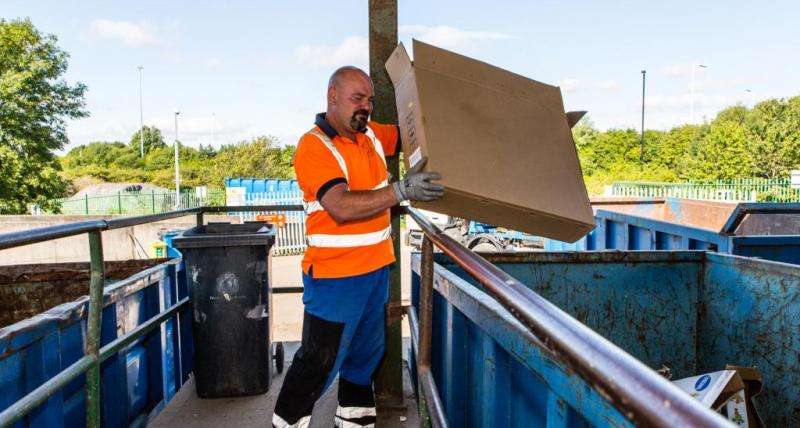
North Tyneside Council will make a number of changes at its Household Waste Recycling Centre (HWRC) in North Shields, to ensure the ongoing safety and sustainability of the site.
From July 2017, the council will bring in a ban on very large vehicles such as ‘Luton’ type vans, tippers, and long trailers, in response to concerns about site safety and the suspected misuse of the site by commercial operators.
The small facility on Wallsend Road is operating at full tilt, with more and more waste being processed at the facility, and running costs are increasing.
Site operator Suez estimates that almost half of all vehicles using the site are vans, with many suspected of bringing in commercial waste illegally, and staff counted more than 2,000 vans using the facility during one week in March.
The ban is one of several measures being phased in to ensure the facility continues to run safely, and to reduce costs. A permit scheme for specified vehicles will also be introduced in the autumn, along with charges for non-household waste.
Councillor John Stirling, Cabinet Member for the Environment said: “We need to make these changes to ensure the ongoing sustainability of this site and the safety of our service users, which is our number one priority.
“The site is meant to be used for household waste but it’s being overwhelmed by very large vehicles which are a significant safety risk to others, not to mention illegal if they’re carrying commercial waste.
“The ban will lead to better safety, less congestion, and shorter waiting times for local people, while also helping the council to achieve significant cost savings and ensure the future sustainability of the site.”
The ban will apply to vehicles over six metres long or two metres tall, as well as trailers over three metres in length, and vehicles exceeding 3.5 tonnes. New signage will be installed to make it clear which vehicles are prohibited and which ones need permits.
The move was prompted by a rise in the volume of rubbish, attributed partly to the growth of new housing in the borough, and also to an increase in business and residential traffic from outside the borough.
Councillor Stirling added: “Other North East councils already operate a permit scheme and we think this is the simplest way to control the volume of waste, the cost of running the facility, and the issue of site safety.
“It will ensure the site is used in the right way and will discourage commercial operators. The charges will only apply to waste that has quite obviously come from a building or construction project.
“We are confident that this new approach will make the HWRC more accessible, efficient and cost-effective, as well as sustainable long into the future.”
Find out more about our Household Waste Recycling Centre.
The changes at a glance:
Ban on larger vehicles
To take effect in July 2017, this will be a complete ban on ‘very large vehicles’, including anything over six metres long and two metres tall, as well as trailers over three metres. Information will be published online and in print to show which vehicles will be banned. These vehicles will be redirected to one of the borough’s commercial waste operators instead. We are also looking to introduce a height restriction barrier on the site. Residents and hire companies will also be advised if hiring a van to check compatibility for access to the site before entering into a hire agreement.
Resident permit scheme
To be introduced in autumn 2017, the FREE permit will ensure the proper use of the site for household waste and discourage commercial operators. This will bring North Tyneside policy in line with neighbouring councils, and will replace the household bill as a form of evidence. Information will be published online to show which vehicles will require a permit.
Charges for non-household waste
Also to be introduced in autumn 2017, these will be charges for anything which is non-domestic household or business waste; primarily construction and demolition material.
